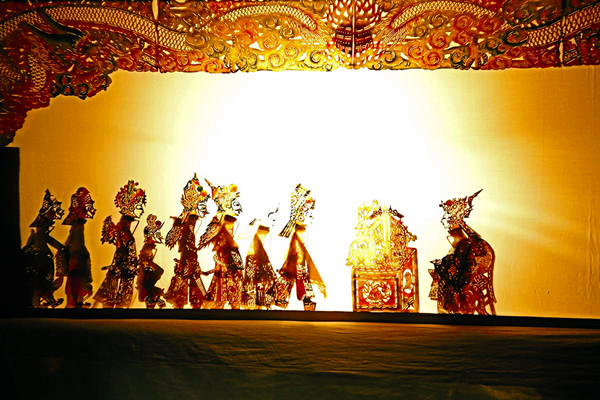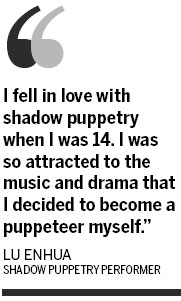

 |
|
Lu Enhua (playing the sihu, or four-stringed spike fiddle, in bottom right picture) leads his shadow puppet troupe to give performances at the Moma Post Mountain Music-Art Festival in Beijing. [Photos provided to China Daily] |
While most Chinese farmers can rest after the harvest in fall, Lu Enhua's busy season is just beginning.
The 49-year-old has a second job as a shadow puppeteer. Together with four other members of his group, he performs in villages throughout Xiuyan county in Northeastern China's Liaoning province where he lives.
It is customary in Xiuyan for people to make wishes in the spring, and if the wishes are realized, they invite shadow puppeteers to perform for their families to thank the Gods.
There are so many invitations that Lu sometimes has to give several performances a day. His packed schedule can last until the Lunar New Year, when the shadow puppet troupes stop performing for three days, before resuming their packed calendar until the end of the first lunar month.
"I fell in love with shadow puppetry when I was 14," Lu says. "I was so attracted to the music and drama that I decided to become a puppeteer myself."
In Xiuyan, shadow puppetry is usually performed by five people, who sing, manipulate the puppets, play instruments, and set up the stage. Lu also makes the puppets manually from donkey hides.
Shadow puppetry in Xiuyan usually tells legends and historical stories, while the music is derived from traditional Chinese operas. The instruments include sihu (four-stringed spike fiddle), banhu (two-stringed spike fiddle), suona (shawm), drums and gongs.
Shadow puppetry was introduced to Xiuyan during the Ming (1368-1644) and Qing (1644-1911) dynasties, and blended with local music such as dangu and errenzhuan, forming its stylistic singing and lyrics.
Compared to other areas, the shadow puppetry of Xiuyan has maintained most of its traditional features, including female roles performed by men.
"In most other areas, women are singing women's roles, but in Xiuyan, only men do the job," says Lu, who himself plays the dan (female) role.
Xiuyan is a mountainous county where about 90 percent of the residents are of the Manchu ethnic group. Transportation is not easy and there are relatively few migrants. Traditional arts are generally well preserved in Xiuyan, and include not only shadow puppetry, but also paper cutting and Shamanistic rituals.
Lu's group gives an average of 200 performances a year. There are three or four other troupes like this in Xiuyan.
Xiuyan Shadow Puppetry has been recognized by UNESCO as an Intangible Cultural Heritage of Humanity since 2011.
Although traditional culture is active in Xiuyan, Lu says shadow puppetry is in decline. He says 20 years ago people used to point out mistakes in the puppeteers' singing and playing, but today almost no one in the audience can do that.

Shadow puppetry was banned during the "cultural revolution" (1966-76), but enjoyed a revival in the late 1970s and early 1980s. The "production teams" (farm production units in the people's commune system) used to invite shadow puppetry troupes to give long performances to entertain villagers. A full drama usually runs two weeks, with an episode each day taking between three and four hours.
After the "production teams" disbanded in the 1980s, full-length performances were no longer practical. Now Lu's troupes usually only perform excerpts, because no one can afford the time and money to watch full-length dramas.
There are also fewer performers. Lu is one of the youngest shadow puppeteers in Xiuyan, as no young people are interested in carrying on the tradition.
To promote traditional arts, the Xiuyan Culture Center has tried various means, including arranging performances in primary and middle schools and producing documentary films.
Luo Xiusheng, director of the Xiuyan Culture Center, is now writing a book about the history of Xiuyan Shadow Puppetry, which includes lyrics and notations that he compiled.
The shadow puppetry of Xiuyan has also attracted attention from elite art circles. In October, Lu's troupe was invited by the Moma Post Mountain Music-Art Festival of Beijing to give three performances. They received positive feedback from audiences and media.
Wang Dong, daughter of puppeteer Wang Jishu, works in Beijing and came to watch her father perform. For the first time in her life, she patiently watched her father give a full performance.
"I grew up with shadow puppetry but I never really liked it," she says. "Now I feel proud of my dad."
muqian@chinadaily.com.cn